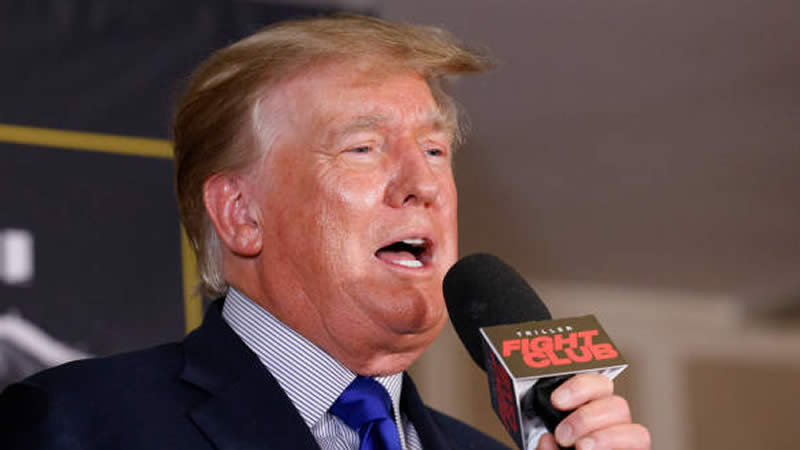This May Be the Strongest Legal Case Against Trump

(credit: Getty Images)
So far this year, Donald Trump has faced two indictments, with the potential for two more investigations to lead to charges by summer’s end. How likely are these to result in a conviction? Bright Line Watch, a political research organization, conducted a survey of hundreds of political scientists to determine the most robust legal case against the former president.
This summer, between June 29 and July 11, Bright Line Watch polled 569 political scientists. They asked about the various allegations connected to Trump: the hush money payment (related to Manhattan District Attorney Alvin Bragg’s indictment), the mishandling of classified documents (the recent Department of Justice’s indictment), interference in the 2020 election (the focus of both another DOJ investigation and Atlanta-area District Attorney Fani Willis’ investigation), and finally, inciting an insurrection at the U.S. Capitol on Jan. 6, 2021 (also under consideration in Jack Smith’s election interference investigation).
The political scientists were nearly in full agreement regarding the DOJ’s classified documents case — believing Trump did take classified documents to his Mar-a-Lago property, stored them in insecure locations, revealed them to unauthorized individuals, and tried to impede the federal investigation into these actions. Overall, 94% of experts felt Trump was guilty of a crime in this situation.
In assessing whether Trump committed a crime, experts ranked interference in the 2020 election as the second strongest offense, followed by the allegations pertaining to Jan. 6. The hush money charges from Bragg found the least support from the experts.
Belief in the DOJ’s classified documents case was so solid that 66% of experts thought it should lead to imprisonment, while 25% supported a fine or probation. A mere 2% of experts felt Trump should face no penalty in this case.
The classified documents case holds a substantial edge due to the wealth of visual evidence. When Special Counsel Jack Smith revealed the DOJ’s indictment, it featured numerous photos of cardboard boxes, allegedly filled with classified documents, scattered throughout Mar-a-Lago, from storage areas to ballrooms and even a bathroom. Smith’s investigation into Jan. 6 also offers convincing evidence, including witness testimonies shared during the House Jan. 6 committee hearings and thousands of internal emails and text messages.
“The evidence related to [classified] documents is more clear-cut regarding legal violation than even what’s been disclosed about Jan. 6,” said Brendan Nyhan, a professor at Dartmouth College and co-director at Bright Line Watch, during an interview. “The likely forthcoming indictments will have to depend on secondhand accounts of complex events and may seem less convincing or straightforward.”
The evidence from the classified documents seems to have also influenced nonexperts. Bright Line Watch presented some questions to a representative sample of 2,776 Americans from all political backgrounds and found that 25% of Republicans believed Trump committed a crime in his handling of classified documents. In an earlier survey from October, before the evidence was released, only 9% of Republicans believed he committed a crime.
Reflecting on the two criminal cases in which Trump has been charged so far, 57% of experts felt the former president is more likely to be convicted in the classified documents case, while only 10% believed that Bragg’s hush money case would more likely result in a conviction. Around 33% of experts felt the likelihood of a conviction was about the same in both cases.
Bright Line Watch researchers argued that the strength of evidence in the classified documents case could potentially undermine the other cases against Trump. “The comprehensive and extensively documented charges related to classified materials set a high evidence threshold that could influence perceptions of other cases against Trump.”
The findings reveal the complexity of assessing a situation when multiple cases are developing in different jurisdictions simultaneously, particularly when they’re centered around a former U.S. president. “It prompts one to ponder: Under what circumstances could a high-profile political figure’s prosecution be deemed legitimate?” asked Nyhan. Respondents (both experts and non-experts) who first considered Trump’s classified documents case were less likely to say Trump committed a crime in the other cases – interfering in the 2020 election, inciting an insurrection, or making hush money payments.
Bright Line Watch also attempted to gauge the perception that Trump is being politically targeted and saw varied results depending on the charges under consideration. Only 15% of experts felt anyone other than Trump would not have been indicted in the classified documents case, while 32% thought Trump is being singled out on the hush money charges.
In a vast majority of experts, 81%, stated that the evidentiary standard for prosecuting a former president should be the same as for an average American. Only 15% thought the evidentiary standard should be higher, with almost no support for suggestions that it should be lower. “Despite all the attempts to keep these prosecutions out of partisan politics, I worry about abandoning criminal prosecution simply due to the political status and partisan identity of the individual in question,” Nyhan expressed. “This is one of many dilemmas that Trump’s political career has presented us with.”


